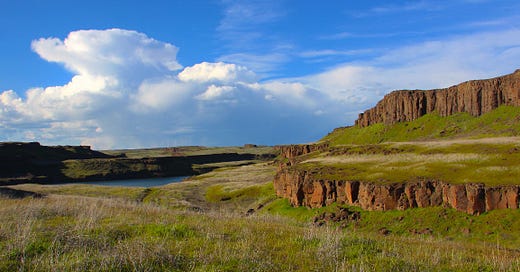“The hours to home” (2017)
Nagasaki
I don't pray as often as I used to, nor as much as I should. But I knew I would need some quiet space, this morning, for extended contemplation and spiritual knitting.
Today is Nagasaki Day, which, in my orbits of consciousness is a familiar moral sojourn. I was born at Hanford, where the plutonium for the core of the Nagasaki bomb (and before that the “Trinity” test explosion that was the apex to the movie Oppenheimer) was created and distilled from a radioactive soup. My dad was on active duty in Korea at the time. An Army doctor at the Hanford field hospital delivered me.
I’ve written, as well as I can, about the moral dilemma through the eyes of Hanford scientists. But there is also family history laced into it, from a decades-long proximity to Hanford and its secrets on my mother’s side and, on my father’s side, to his emotional memories of his Uncle Joe, a veteran of the war against the Nazis in Germany. (My mother was on thyroid medication for most of her life, quite likely as a consequence of her unwitting exposure to Hanford radioactive iodine when she was at a young and vulnerable age, living just a few miles downwind and downstream from Hanford’s plutonium extraction plants.)
Retired plutonium extraction plant in Hanford’s “200 West” area.
Dad remembers Uncle Joe coming home to Scranton from the war in Europe. Another uncle, his mother’s younger brother Tommy, was killed in a tank battle. Uncle Joe was a survivor of war but with what we now call post-traumatic stress. Shell shock is what they called it then. Uncle Joe made clear he was done with war. Dad remembers that Joe was very anxious, to say the least, for fear he would be summoned back to active duty to fight in the expected invasion of Japan. It was the Nagasaki bomb—three days after the Hiroshima bomb—that led quickly to the celebration of Japanese surrender a week later. Uncle Joe could rest easy, the Second World War was over.
There is an emotionally-wrenching scene in the 2023 epic film Oppenheimer that is without dialogue. It a visual art piece where the raucous, patriotic celebration at Los Alamos is intertwined with images of human carnage alluding to the effects of the bombs’ devastating explosions in Japan. Beyond that there is and will always be the argument about whether using weapons of mass destruction against cities was necessary to end the war in Japan. It’s an important argument but, blessedly not an argument that ever arose between me and my father.
Peace Bell at the Nagasaki Peace Park. (Image courtesty Wikimedia Commons)
There was room for a wrenching debate. On the knife’s edge was the question of whether we would have supported not using the A-bomb even if that meant forcing Uncle Joe onto a landing craft, or into jail for refusing to pick up arms again. The short answer is we decided an argument wasn’t necessary—not necessary for us, and especially unnecessary because he didn’t get a vote and I wasn’t even an embryo at the time. It was enough to know what happened.
Please support The Daily Rhubarb with a paid subscription at the link below
More so, he and I became very close in his last years, with deepening affection and respect for each other. Our arguments, few that there were, were largely mundane and nearly always inflected with laughter. Beyond that, we shared an understanding that not every moral quandary needs to be argued to a point where the blades of our righteousness get exposed like the teeth of an angry doberman. More often than not, it’s better and much healthier to give a nod of understanding to each other’s perspective; then go rake the yard.
A lasting footnote to my reporting on Hanford is that when I met the dissident Hanford scientists and their supporters four decades ago their meeting place was miles away from Hanford, at a church basement in Pasco, where my mother’s grandfather was once the pastor. His picture was still on the wall the last time I visited. Those memories have an enduring swirl to them, like the timeless winds in the Horse Heaven Hills above the visiting river.
—tjc










